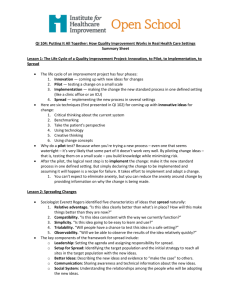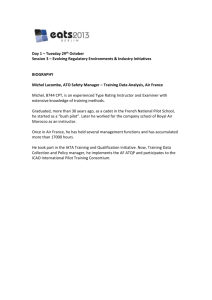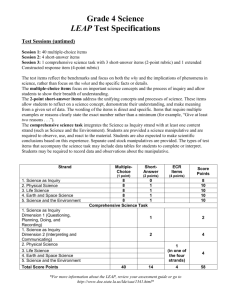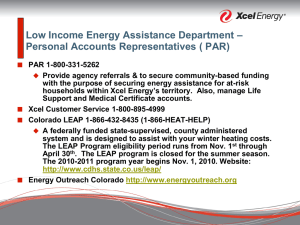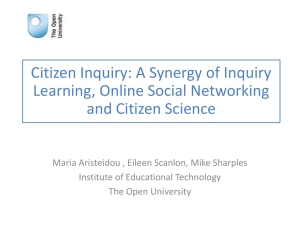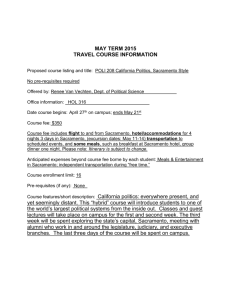If We Were a Hospital We'd Be Shut Down: "Give Students a Compass"
advertisement
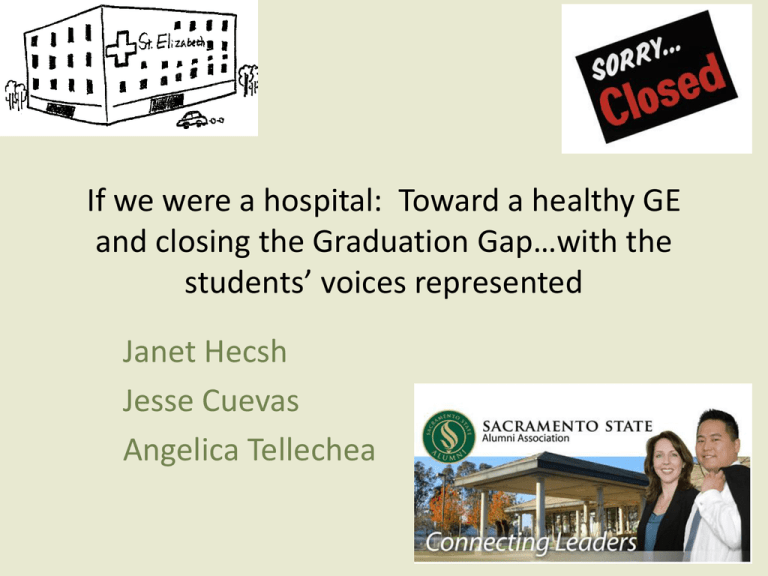
If we were a hospital: Toward a healthy GE and closing the Graduation Gap…with the students’ voices represented Janet Hecsh Jesse Cuevas Angelica Tellechea Sac State Compass Initiatives • GE Reads • GE Seeds – Pilot GE – 10 Word/One Book – Concept Development – Faculty Interest Groups Compass at Sacramento State University Goals (January, 2009) Accomplishments (May, 2010) • Mobilizing support for LEAP+ outcomes and process/criteria for “area” objectives etc. • • Support and strengthen the projects underway (FYE SacReads, One Book, English Pilot) • “Seed” GE Pilot’s Using LEAP+ Goals, Outcomes and Objectives as a framework • • • • Gather data about student/faculty perspectives on student learning in GE Faculty Senate adopted new Baccalaureate Learning Goals with LEAP embedded (Nov., 2010) and alignment of goals, area objectives, and assessment using VALUE rubrics underway. GE Reads—Faculty Inquiry Group and 10 Word One Book projects completed, documented, disseminated and expanded for AY 2010-11 Sacramento State Studies (DELIVERED!!!) Qualitative data (open ended surveys, student panels, faculty workshops, discussion boards) about student/faculty perspectives on student learning in GE Nevertheless… Think, Pair, Share • How does the “hospital” metaphor play out in your institution? Is it an apt one? • What other metaphors do your colleagues use to describe their work or their institutional culture? • What sorts of metaphors do students use? (How) do we know what they think? What their parents and families think? • How/why does it matter? Implications Charged Conversations • Does something need to be “broken” to be improved? • Whose voices are heard, need to be heard, never heard and what does it take to give voice those who are silenced? • What does it take to move beyond being “museums of virtue” or “hospitals” to really becoming the centers of innovation and experimentation? Over regulated/Underexamined? • • Educational Assumptions of the Sac State GE Pilot Proposal Approved by GE Workgroup 2/8/10 • Education is more than knowing; it includes knowing how to think and know, how to learn, how to communicate, and how to do what one knows in an ethical, responsible, and effective way that contributes to the self and to the public. Hence, the four lower-division semesters are organized according to themes. • • • • • • • • • • Educators are obligated to make learning outcomes clear to their students and to provide ongoing opportunities for students to develop them; educators must agree and share understandings of core learning outcomes in a way that fosters student motivation and willingness to do rigorous intellectual work to accomplish them over long time periods. Learning activities assigned to students must be carefully connected to learning outcomes and to contemporary local and global civic engagement. Such activities are subject to continuous improvement based upon feedback from students. Assessment is a crucial element of learning and must include self-assessment on the part of teachers and learners individually and collaboratively. All teachers in the GE curriculum must act on their responsibility to collaborate with colleagues on program assessment. Every unit, every course, every block of courses must be built to contribute to the whole program and to the holistic development of each student. The GE curriculum must evolve and change over time as the faculty learn more collectively about what works well and what doesn’t work in relation to student achievement of the learning outcomes. • • No one College, department, or discipline owns the GE curriculum in part or in whole. The GE curriculum belongs to the entire faculty. • In a general sense, I think it is important to note who approved the Educational Assumptions of the Sac State GE Pilot Proposal. I assume that it is the Senate’s GE Policy Committee, but you don’t say that. Student GE Experience GE Requirements Curriculum and Faculty Contribution to the human capital Transient voice Faculty needs to include student voice in their decision making. College Graduates Alignment Disconnect Baccalaureate Learning/LEAP Goals Translate into the world? Student Compass What do you want to be when you grow up? Academic Advising Degree Evaluation (Registrar) Disconnect between realities = student confusion Think, Pair, Share II • How do faculty think about, discuss, reflect upon their teaching, student learning? • What is the student role/voice/input beyond the traditional evaluation process? • What potential exists for Faculty Interest Groups on your campus? • How are students engaged in the academic side of the house beyond their role as recipients of the gift of knowledge? Student Involvement Who are students? School, work, spare time? Transient voice Student population turnover Membership of policy makers Administration, Faculty, Students Committee discussions Dictated by Chair Student Voice is About Outcomes and People! What Can Student Voice Positively Affect? School improvement goals Academic achievement The "engagement gap" Students' feelings of agency Drop out rates Retention of students: under represented populations Curricular effectiveness Teachers' feelings of efficacy Still…. Content, Ownership • • SSS Proposed Common Interdisciplinary Themes---to which faculty may adjust or repurpose or invent interdisciplinary courses. The themes below will guide faculty as • they develop curriculum. – •Globalization – •Sustainability – •Technology, Society and the Digital Age – •Social Change and Social Justice – •Culture and Ideas – •Sacramento and California in 21st Century – •Body, Mind, Well Being I think the science and math departments may have a problem putting 12 units of math and science in these headings. My own department has a significant investment in GE service course: We primarily teach upper divisions classes to transfer students and would not be heavily affected by the GE PP in the short term. However, as written, the GE PP does remove a significant number of students from the open pool of people searching for stand-alone GE courses at the lower division level. As such, I think it would be reasonable to be concerned about fiscal implications if one’s department is heavily invested in those offerings. Clearly, that doesn’t make the GE PP either good or bad, but it does remain a necessary topic for discussion and concern. Multiple Audiences, Multiple Lens • • The Sac State Studies program is organized around the LEAP outcomes embedded in the newly adopted Baccalaureate Learning Goals as outlined in EO 1033. Pilot Sacramento State Studies courses— Learning Collaboratives-- will be taught by interdisciplinary teams of faculty working closely with a designated “pilot” librarian. – – – – – Instruction takes place in a series of 9-unit, lower division interdisciplinary courses Each Learning Collaborative enrolls approximately 150 students The successful completion of four Learning Collaboratives is the equivalent of 36 Units of credit applied toward GE A-E and Graduation Requirements one course taken in each of a student’s first four semesters. Each of the three faculty members receive 6 WTUs for planning, teaching, and evaluating student learning. Faculty will assign and submit grades according to current practice. • It is really important to make this clear. You should show how the newly designed courses will meet the A-E mandate of EO 1033 and Title V 40405.1 • Also, we talk about learning collaboratives, but I actually think we're talking about Teaching Collaboratives (e.g., three faculty teaching across disciplines, departments and colleges). We really do have to explain things in a bit more of an organized and systematic way assumes that most readers will not understand most of the words being used Germinating…. • Student Interest Groups • Faculty Student Interest Groups Working with, talking to each other… • • • • • • • Annual GE Recognition Workshops sponsored by Compass Student Panels GE Themes Survey “One-on-Ones” Discussion Boards Newsletters (GE, Assessment) *How the Faculty Interest Group worked… • Two day Summer Retreat-Reading Focus • Established “place” for resources/communication: – gereadsgooglegroup • Monthly meetings • Inquiry agenda – Research questions (Reading in GE—in Biology, Honors Humanities, First Year Seminar,) – Data collection – Data analysis – Paper product (I-Search papers, monograph) – Documentary Film • WASC • UTUBE *A DIFFERENT WAY TO THINK ABOUT DEVELOPMENTAL EDUCATION: FACULTY INQUIRY IN ACTION GUIDELINES FOR WORKING TOGETHER TO IMPROVE STUDENT LEARNING BY ROSE ASERA (CARNEGIE, 2008 *How the FIG worked… • Two day Summer Retreat-Reading Focus • Established “place” for resources/communication: – gereadsgooglegroup • Monthly meetings • Inquiry agenda – Research questions (Reading in GE—in Biology, Honors Humanities, First Year Seminar,) – Data collection – Data analysis – Paper product (I-Search papers, monograph) – Documentary Film • WASC • UTUBE *A DIFFERENT WAY TO THINK ABOUT DEVELOPMENTAL EDUCATION: FACULTY INQUIRY IN ACTION GUIDELINES FOR WORKING TOGETHER TO IMPROVE STUDENT LEARNING BY ROSE ASERA (CARNEGIE, 2008 Sacramento State Studies • • • • • Provost called for a “work group” (Jan. 2010) “Work group produced a proposal (March 2010) based feedback from students, staff and faculty. – Highly contested – One member “walked” Rumors spread about “changing GE without following policy” (April, 2010) – Union sent out a note for representation at the policy meeting – Campus “oracle” heavily consulted to see if process or policy had been violated – Memos varying in civility (some public, some private) circulate – Public discourse is heated and somewhat incivil Public Meetings and Consultation (April, May, 2010) – Policy and Process are validated – Proposal is revised with consultation Motions Passed GE (May, 2010) – On the way to the Senate Students are not sick people trying to get well….Faculty are not doctors…universities are not hospitals • But….if the metaphor is at all useful, how do we improve the experience and the outcomes for all the stakeholders, especially those least empowered to participate in determining their experiences? Speaking of Students….
